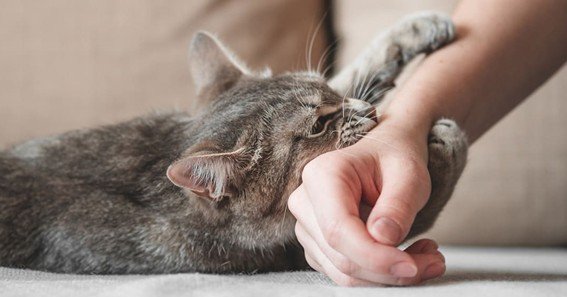The why does my cat bite me gently out of nowhere question puzzles many cat owners when their normally sweet feline companion suddenly nibbles them without warning. These soft bites—often called “love bites”—aren’t typically aggressive but serve as a form of communication rooted in grooming behaviors, playfulness, and even gentle admonishment.
Understanding Gentle Cat Bites
Cats instinctively groom each other by licking and nibbling, which helps remove dirt and strengthen social bonds. When your cat gives you a light bite, it may be replicating this allogrooming behavior to show affection and include you in their social group, Applaws US. PetMD also distinguishes these soft “love bites” from serious bites, noting that affectionate nips lack the force, accompanying hissing, or dilated pupils typical of defensive or fearful bites.
Common Reasons Cats Give Gentle Bites
-
Affectionate Grooming: Like mother cats tending their kittens, your cat may nibble you as part of its care routine, signaling that it considers you family, Applaws US.
-
Play Behavior: Cats often use their mouths during play with littermates. When playing with you, gentle biting can simulate hunting or wrestling games, especially in younger, energetic cats.
-
Attention Seeking: A soft nip can be your cat’s way of saying, “Look at me!” or “Pet me more,” particularly if they feel ignored.
-
Overstimulation: Even pleasant petting can become too intense. Once your cat’s threshold is reached, it may deliver a quick nip to say “That’s enough” often accompanied by a twitching tail or lowered ears.
-
Communication of Discomfort: Occasionally, a gentle bite might indicate mild pain or annoyance, such as if you’re touching a sensitive spot, Everypaw.
How to Respond to Gentle Bites
-
Read the Body Language: Watch for signs like flicking tails, flattened ears, or a sudden pause in purring—these precede a bite of overstimulation.
-
Redirect Play Biting: Offer a toy for your cat to grab and nibble instead of your hand; this helps them practice appropriate play behavior.
-
Set Boundaries: If your cat bites during petting, calmly withdraw your hand and pause interaction for a moment so they learn that nipping ends the fun.
-
Reinforce Positive Behavior: Praise or gently pet your cat when they remain calm; use treats to reward non-biting interactions.
-
Consult a Vet if Needed: If biting increases in frequency or intensity, rule out medical issues like dental pain or arthritis.
Frequently Asked Questions
1. Are gentle cat bites a sign of love?
Yes—often called “love bites,” these soft nibbles mimic grooming behaviors that strengthen bonds among cats, and when directed at you, they signify inclusion in your cat’s social circle Applaws USPetMD.
2. How can I tell if a bite is affectionate or aggressive?
Affectionate bites are light and usually follow purring or licking, without flattened ears or hissing. Aggressive bites are harder, accompanied by defensive body language like dilated pupils and growling.
3. What should I do when my cat bites me during play?
Stop using your hand as a toy; instead, offer interactive toys (feather wands, stuffed mice) to satisfy your cat’s hunting instincts without risking your skin.
4. Can overstimulation cause gentle biting?
Absolutely. Cats have a petting threshold—once reached, they may nip to signal overstimulation. Look for tail flicks or skin rippling before the bite.
5. When should I worry about my cat’s biting?
If nips break the skin, increase in force, or occur alongside aggression toward other people or pets, consult your veterinarian or a certified animal behaviorist to rule out health or behavioral issues










